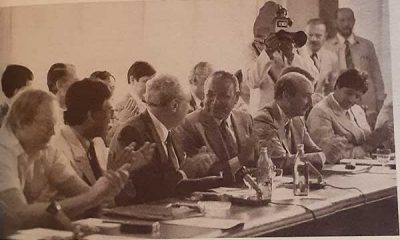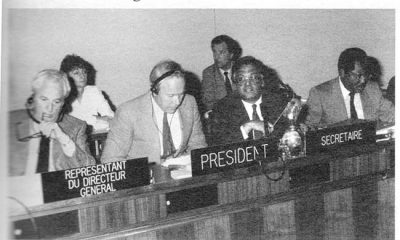News
Private education has grown faster in South Asia than in other regions – UNESCO

A new UNESCO Report released last week (Nov 2) shows that non-state actors in South Asia are more involved in every aspect of education systems than in any other world region. Highly competitive examination pressures and dissatisfaction with public schools led to the highest levels of enrolment in private institutions in primary and secondary education than in other regions, but also to extensive private tutoring and an explosion of education technology companies.
With fragmented systems stretched during the pandemic, and evidence of a shift of students from private to public schools, the report calls for a review of existing regulations on non-state actors and how they are enforced. While access to education has grown faster than in any other region in the past few decades in South Asia, learning levels are more than one third below the global average and growing more slowly than in the rest of the world. It recommends that all state and non-state education activities be viewed as part of one system, supported and coordinated ministries of education so that quality and equity can be improved.
The report draws on the global comparative research by the Global Education Monitoring Report at UNESCO and six regional partners: BRAC; the Institute for Integrated Development Studies; theInstitute of Policy Studies of Sri Lanka; Idara-E-Taleem Oaagahi(Centre of Education and Consciousness); the Center for Policy Research; and the Central Square Foundation. Combining the experiences of Afghanistan, Bangladesh, Bhutan, India, the Islamic Republic of Iran, Maldives, Nepal, Pakistan and Sri Lanka, it looks at occasions where the growing advent of private education has put equity under pressure but also at positive practices that have created cohesion across all actors involved.
Non-state actors are influential across all education levels in the region. In early childhood, the private sector is often the main provider, educating 93% of children in the Islamic Republic of Iran, for instance. At the primary level, private schools educate a quarter of students in Nepal, over a third in Pakistan and almost half in India. Low-fee private schools have flourished. Out of all new schools established in India since 2014, 7 in 10 are private independent schools. In Bangladesh, a quarter of primary and almost all secondary school enrolment is in private institutions. International schools have grown alongside the demand for English-language education, effectively doubling in Sri Lanka between 2012 and 2019.
Tertiary education is increasingly private due to insufficient public supply, covering over half of enrolment in Afghanistan by 2020. In Nepal, the limited capacity of the main public university in the country led to the establishment of non-state campuses. Teacher training institutions are also often private with teacher education only provided exclusively by the state in two countries, Bhutan and the Islamic Republic of Iran. In 2020, more than 90% of recognized pre-service teacher education institutions in India were privately funded through student fees.
Competitive education systems and labour markets have led to a surge in private tutoring, putting pressure on household finances. In Sri Lanka, the percentage of households spending on private tutoring increased between 1995 and 2016 from 41% to 65% of urban households and from 19% to 62% of rural households; it increased in Bangladesh between 2000 and 2010 from 28% to 54% in rural areas and from 48% to 67% in urban areas. The popularity of private tutoring has led to a rise of coaching centres; in India, their number may run into the hundreds of thousands.
News
US sports envoys to Lanka to champion youth development

The U.S. Embassy in Colombo welcomed the U.S. Sports Envoys to Sri Lanka, former National Basketball Association (NBA) and Women’s National Basketball Association (WNBA) players Stephen Howard and Astou Ndiaye, from June 8 through 14.
The Public Diplomacy section of the U.S. Embassy said that it would launch a weeklong basketball program intended to harness the unifying power of sports, made possible through collaboration with Foundation of Goodness and IImpact Hoop Lab.
While in Sri Lanka, Howard and Ndiaye, both retired professional basketball players, will conduct a weeklong program, Hoops for Hope: Bridging Borders through Basketball. The Sports Envoys will lead basketball clinics and exhibition matches and engage in leadership sessions in Colombo and Southern Province for youth aged 14-18 from Northern, Uva, Eastern and Western Provinces, offering skills and leadership training both on and off the court. The U.S. Envoys will also share their expertise with the Sri Lanka Basketball Federation, national coaches, and players, furthering the development of basketball in the country. Beyond the clinics, they will collaborate with Sri Lankan schoolchildren to take part in a community service project in the Colombo area.
“We are so proud to welcome Stephen and Astou as our Sports Envoys to Sri Lanka, to build on the strong people-to-people connections between the United States and Sri Lanka,” said U.S. Ambassador Julie Chung. “The lessons that will be shared by our Sports Envoys – communication, teamwork, resilience, inclusion, and conflict resolution – are essential for leadership development, community building, equality, and peace. The U.S. Sports Envoy program is a testament to our belief that sports can be a powerful tool in promoting peace and unity.”
News
Rahuman questions sudden cancellation of leave of CEB employees

SJB Colombo District MP Mujibur Rahuman in parliament demanded to know from the government the reasons for CEB suspending the leave of all its employees until further notice from Thursday.
MP Rahuman said that the CEB has got an acting General Manager anew and the latter yesterday morning issued a circular suspending leave of all CEB employees with immediate effect until further notice.
“We demand that Minister Kanchana Wijesekera should explain this to the House. This circular was issued while this debate on the new Electricity Amendment Bill was pending. There are many who oppose this Bill. The Minister must tell parliament the reason for the urge to cancel the leave of CEB employees,” the MP said.However, Speaker Mahinda Yapa Abeywardena prevented Minister Wijesekera responding to the query and said that the matter raised by MP Rahuman was not relevant.
News
CIPM successfully concludes 8th Annual Symposium

The Chartered Institute of Personnel Management (CIPM) successfully concluded the 8th Annual CIPM Symposium, which took place on 31st May 2024. Themed “Nurturing the Human Element—Redefining HRM in a Rapidly Changing World,” the symposium underscored the pivotal role of human resource management (HRM) in today’s dynamic global landscape. Since its inception in 1959, CIPM has been dedicated to advancing the HR profession through education, professional development, and advocacy, solidifying its position as Sri Lanka’s leading professional body for HRM.
Ken Vijayakumar, the President of the CIPM, graced the occasion as the chief guest. The symposium commenced with the welcome address by the Chairperson, Prof. Arosha Adikaram, followed by the Web Launch of the Symposium Proceedings and Abstract Book by the CIPM President. The event featured distinguished addresses, including a speech by Chief Guest Ken Vijayakumar, President of CIPM, and an address by Guest of Honor Shakthi Ranatunga, Chief Operating Officer of MAS Holdings Pvt. Ltd., Sri Lanka.
The symposium also featured an inspiring keynote address by Prof. Mario Fernando, Professor of Management and Director of the Centre for Cross Cultural Management (CCCM) at the University of Wollongong, Australia.
Vote of Thanks of the inauguration session was delivered by Dr. Dillanjani Weeratunga, Symposium Co-chair.
The symposium served as a comprehensive platform for researchers to present their findings across a wide range of critical topics in HRM. These included Cultural Diversity and Inclusion, Talent Development and Retention, Ethical Leadership and Corporate Social Responsibility, Adapting to Technological Advancements, Mental Health and Well-being at Work, Global Workforce Challenges, Employee Empowerment, and Reskilling and Upskilling.
The plenary session was led by Prof. Wasantha Rajapakse. Certificates were awarded to the best paper presenters during the valedictory session, followed by a vote of thanks delivered by Kamani Perera, Manager of Research and Development.
The annual symposium of CIPM was a truly inclusive event, attracting a diverse audience that spanned undergraduates, graduates, working professionals, research scholars and lecturers. This widespread interest highlights the symposium’s significance in the field of HRM, offering a unique opportunity for everyone to network and learn from scholarly brains.The CIPM International Research Symposium was sponsored by Hambantota International Port, Sri Lanka Institute of Information Technology (SLIIT), E B Creasy & Co. PLC, and Print Xcel Company.






















